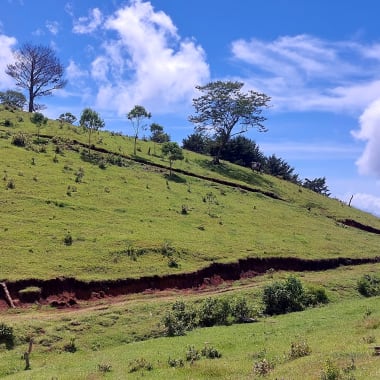-
Producer
-
Baroida Estate
-
Country
- Papua New Guinea
-
Region
-
Eastern Highlands
-
Altitude
-
1,685–1,870m above sea level
-
Varieties
-
Process
-
Harvested
-
May 2019
-
Importer
-
MTC
-
Body
-
Medium
-
Acidity
-
Crisp
-
Tasting notes
-
Crisp apple acid, malty
-
Roast style
Papua New Guinea
Boana
Baroida Estate is located in the Aiyura area of Kainantu District, Eastern Highlands Provence. The estate was founded by Ben Colbran in the 1960’s when the Government encouraged foreign agriculturalists to begin cultivating land throughout the highlands.
Ben first purchased the land from a native man named Taro and was amongst the first farmer to cultivate coffee in these valleys. Today, Ben’s son Nicol runs the plantation.
The name ‘Baroida’ comes from the Baroida spirit, believed by locals to reside in a large river rock sitting in one of the main rivers flowing through the estate. This particular rock, has stubbornly remained in the middle of the river for as long as anybody can remember, refusing to budge through the most severe floods, even when other rocks have been washed away.
For decades, the Colbrans served as collectors and agents for large multinational traders, supplying high-grade plantation coffee and also locally sourced parchment. Although highly sought after, these coffees were fundamentally undervalued. In early 2010, our sourcing partners MTC and the Colbran family partnered, with the aim to focus on unique, small lot specialty coffees.
Boana is sourced from surrounding small-holder coffee communities who delivery fresh cherry to the Baroida wet mill collection. The cherry is sorted and checked for quality and the growers are paid on the spot for their crop.
The coffee is processed by the Colbrnas at the Baroida mill. The Colbran family continue to push the quality envelope in one of the most challenging coffee. Flavor profiles here are incredibly unique, with an intense and vibrant fruit-forward expression.
Learn everything about this coffee:
Ethical, traceable sourcing
This page has all the sourcing information (variety, process, region, story, importer, and more) that our importers share with us, and give us permission to use.
The transparency helps us talk confidently about the quality and background of our product, and it helps you know exactly what you’re buying.
Learn more:
Coffee page transparency legend
Our coffee philosophy
Our business approach
Fresh harvest coffee
We only source and roast coffee from each country’s latest harvest season (so the green coffee is never older than 1 year from the time of picking, processing and packing). This ensures the sensory qualities are always at their peak and unaffected by excessive ageing.
Roasted for espresso and filter (best enjoyed black)
Roast style: omni. Omni roasts are designed to brew and taste great both as espresso and filter. Our omni single origins generally sit on Agtron values in the ~70-60 value range. So, technically, they are somewhere in the lighter side of the medium spectrum.
Designed for espresso and filter brewing. Best enjoyed black.
Learn more:
Our Loring Kestrel S35 roaster
Our roasting style and approach
Best brewed within days 15-49 post-roast
The ‘fresh is best’ saying doesn’t apply to coffee (contrary to popular belief). Waiting before opening and brewing your bag of whole coffee beans helps develop peak flavour and acidity.
But heads up: if you buy pre-ground coffee, brew it as soon as possible.
Learn more:
Our recommended brewing window
Try our custom brewing recipes
Our recipes and ratios are tailored to our coffee sourcing and roasting styles, bringing the best flavour and feel out of each coffee.
For pour over, immersion, and other filter brewing styles, check our brew guides.
For our espresso single origins, we recommend a coffee:yield ratio of 1:3:
- Dose: 20g ground coffee
- Yield: 60g espresso
- Total brew time: ~24-28 seconds
This is just a starting point! We encourage you to experiment, taste, and adjust to find the recipe that you enjoy the most.
Learn more:
Our espresso brew guide (single origin)
Brewing ratio calculator
Packaging and sustainability
- Bags: ABA-certified home compostable (AS 5810-2010)
- Labels: recyclable
- Valves (only on +250g bags): general waste
- Box and tape (online orders): recyclable
Learn more:
Our packaging
Varieties
Arusha variety
This is a new varietal! We’ll add more details here soon.
Bourbon variety
A natural mutation of the Typica varietal, Bourbon is named after Reunion Island (then known as Il Bourbon) where the French cultivated the Typica plants which naturally mutated.
Typica variety
Considered to be one of the ‘genus’ varietals from which all other varietals have mutated from
The location
Coffee from Papua New Guinea
PNG is a new and exciting country for us – stay tuned for more details
Farm processes
Washed process
Machines are used to remove the flesh from the coffee cherry before being fermented in water, washed again, and finally sun dried. This process tends to result in more distinct, cleaner flavours.

Subscribe to a world of coffee
Discover a new single origin coffee from Sample every 1-5 weeks with no delivery fees.
No up-front purchase, and you can pause, cancel, or change plans at any time.
Available to order online this week:

Mexico Isavel Lopez Pablo
Flavours of blueberry, dried cranberry, white peach, nectarine
Body Acidity
Washed Typica
April 2025 harvest
Roasted omni for filter and espresso
Mexico Isavel Lopez Pablo online
Colombia Rigoberto Chavarro
Flavours of brown sugar, wine gum, candied stone fruit
Body Acidity
Washed Pink Bourbon
February 2025 harvest
Roasted omni for filter and espresso
Colombia Rigoberto Chavarro online
Kenya Karimikui
Flavours of blood orange, blackberry, plum jam
Body Acidity
Washed Batian, SL28, SL34, Ruiru 11
November 2024 harvest
Roasted omni for filter and espresso
Kenya Karimikui online
El Salvador Manuel Castañeda
Flavours of toffee apple, cranberry, dulce de leche
Body Acidity
Honey Pacamara
March 2025 harvest
Roasted omni for filter and espresso
El Salvador Manuel Castañeda online